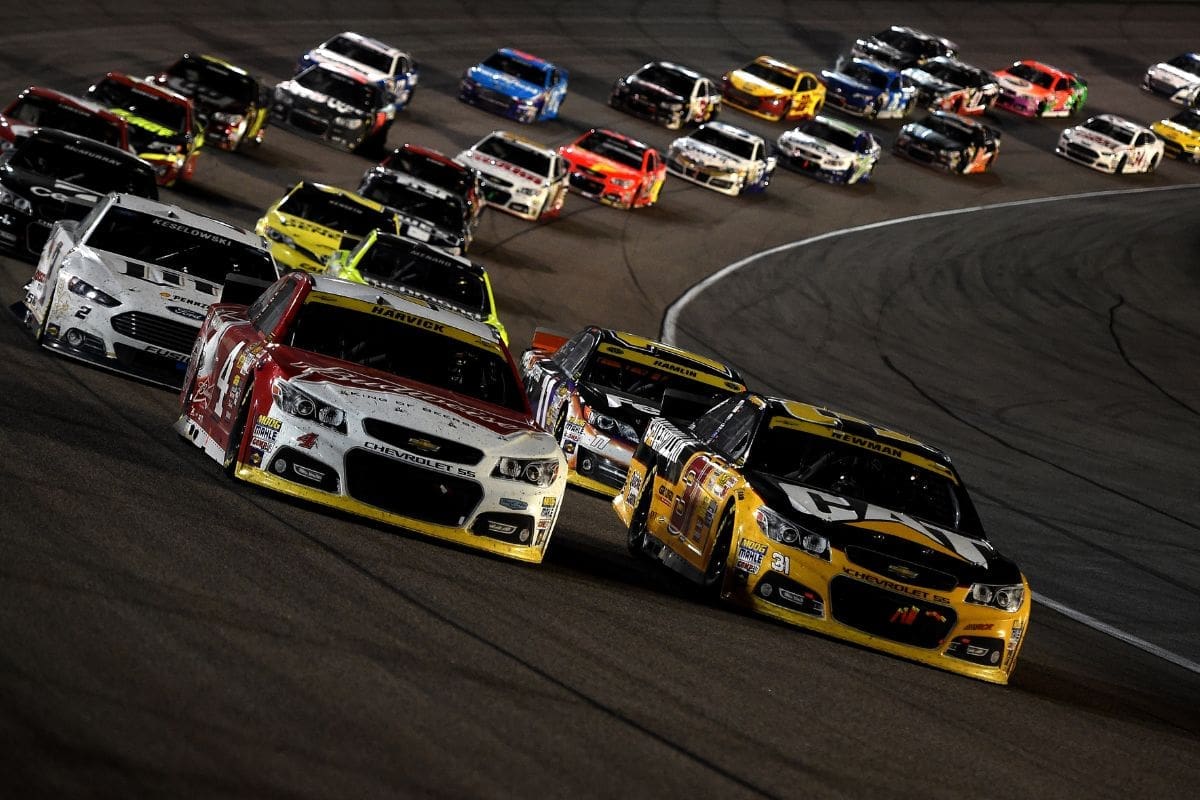NASCAR’s Big TV Deal Hits Cup Teams: NASCAR’s $7.7 billion TV deal, while seemingly a boon for the sport, has cast a shadow over the financial stability of NASCAR Cup Series teams as the expiration of the charter system looms. With Stewart-Haas Racing‘s recent announcement highlighting the nature of team finances, the focus has shifted to the intricate dynamics of sponsorship challenges and charter market fluctuations. The disparity in revenue distribution has further exacerbated tensions, prompting critical negotiations with the Race Team Alliance. As NASCAR CEO and President’s statements suggest a watershed moment, the unfolding discussions could redefine the financial architecture of the sport.
Key Highlights
- NASCAR’s $7.7 billion media rights deal has intensified debates over equitable revenue-sharing among Cup teams.
- Only 25% of race income is allocated to teams, causing financial strain and uncertainty for mid-tier teams.
- Stewart-Haas Racing’s exit and escalating charter costs highlight market volatility and financial challenges for teams.
- Teams are advocating for a fairer revenue distribution to ensure sustainability and competitive balance.
- The absence of permanent charters and financial uncertainty adds complexity to the future of Cup teams.
Charter Deal Expiration and Stewart-Haas Racing Announcement
As the expiration date for NASCAR’s charter deal looms on December 31, Stewart-Haas Racing’s recent announcement to vacate four starting spots has sent shockwaves through the racing community, highlighting the delicate financial future for many Cup teams. This development emphasizes the increasingly fragile economic landscape within NASCAR, as teams grapple with the uncertainty surrounding the charter system, a vital element that currently governs team participation and revenue distribution in the Cup Series.
The charter system, implemented in 2016, was designed to provide teams with a greater sense of security and financial stability by guaranteeing entry into each race and offering a share of the sport’s revenue. However, the impending expiration of this deal has rekindled anxieties, particularly in view of comments from NASCAR’s CEO that permanent charters are not on the table. This disclosure has exacerbated concerns over long-term financial viability, especially for mid-tier and smaller teams that rely heavily on the assurances provided by the charter system.
Stewart-Haas Racing’s decision to leave four starting spots signals a broader unease about the sport’s economic model. It reflects the challenges teams face in securing sufficient sponsorship and managing escalating operational costs. The move by such a prominent team highlights the gravity of the situation and could trigger a domino effect, prompting other teams to reevaluate their positions.
The implications of this uncertainty are profound. The potential for reduced grid sizes and the exit of established teams could erode the competitive fabric of NASCAR, ultimately diminishing fan engagement and undermining the sport’s commercial appeal. As the charter deal’s expiration date approaches, the stakes mount on NASCAR to navigate these turbulent financial waters and secure the future of its Cup Series teams.
NASCAR CEO’s Statement and Media Rights Deal
NASCAR CEO Jim France’s recent statement, highlighting the refusal to entertain calls for permanent charters, emphasizes the sport’s dependence on mutual support between the governing body and the teams, particularly in view of the new $7.7 billion media rights deal that has intensified demands for a more equitable distribution of revenue. France’s stance highlights the delicate balance that exists within the NASCAR ecosystem, where the revenue-sharing model is crucial to both the sport’s sustainability and the teams’ financial viability.
The $7.7 billion media rights deal, a significant financial windfall for NASCAR, has sparked a lively debate among stakeholders regarding the allocation of funds. Teams argue that the current revenue-sharing mechanism is unfairly skewed in favor of NASCAR, leaving them with a fraction of the proceeds despite bearing significant operational costs.
Jim France has reportedly told teams that @NASCAR can't offer permanent charters because, "We can only support you as long as we are being supported [by media networks]." – @ESPN https://t.co/XcYZbQcBgf
— Adam Stern (@A_S12) June 10, 2024
- Economic Sustainability: The refusal to grant permanent charters could be a strategic move to maintain influence and flexibility in negotiations, ensuring that teams remain financially incentivized to perform and innovate.
- Revenue Allocation: Teams are increasingly vocal about the need for a more balanced revenue distribution model that reflects their crucial role in the sport’s appeal and success.
- Operational Costs: Teams face escalating costs related to technology, personnel, and logistics, necessitating a reassessment of financial support mechanisms.
- Competitive Balance: Ensuring a fair share of media rights revenue to teams could improve competitive balance, fostering a more dynamic and engaging racing environment.
Sponsorship Challenges and Charter Market Dynamics
Sponsorship challenges have become increasingly pronounced, with recent trends indicating a waning interest in the sport, compelling race teams to navigate a precarious financial landscape while vying for limited resources. NASCAR’s efforts to revitalize interest through a more exciting product have not fully ameliorated the tenacity of sponsorship deals. Teams, particularly those not graced with the strategic genius and resources of powerhouses like Rick Hendrick or Joe Gibbs, find themselves in a delicate position.
The 7-year charter deal, intended to provide financial stability, has inadvertently fueled concerns among newer, ambitious teams like 23XI Racing and Spire Motorsports. Michael Jordan, co-owner of 23XI, has pointedly remarked on the potential demise of NASCAR if restrictive charter policies continue amid inflationary demands.
The dynamics of the charter market further complicate the financial outlook. Spire Motorsports’ acquisition trajectory exemplifies the escalating costs and risks. In 2018, Spire secured their initial charter for $6 million from Furniture Row Racing. Fast forward to 2023, and the cost of their third car entry for Zane Smith has soared to approximately $40 million. This sharp escalation reflects a volatile market where the price for a guaranteed points-paying starting spot now hovers around $25 million, as reported by reputable sources like Ryan McGee.
Charter Demand and Revenue Disparity
How does the escalating demand for charters reflect the broader issue of revenue disparity, which has cast a shadow over the financial sustainability of NASCAR’s cup teams?
The increasing appetite for charters, particularly evident in the ambitions of teams like 23XI Racing and Trackhouse Racing, highlights a systemic imbalance in NASCAR’s financial ecosystem. This demand is not merely a quest for competitive advantage but an urgent necessity driven by the inadequacies of the current revenue-sharing model, which allocates only 25% of race income to the teams.
The disparity is evident when compared with the distribution of the remaining 75% of revenue, which primarily benefits the racetracks and NASCAR itself. This allocation strains team budgets, making the acquisition of additional charters a critical strategy for survival and competitiveness.
- Market Volatility: Stewart-Haas’s foreclosure creates opportunities but also highlights the precarious nature of team finances. Teams are perpetually on the edge, with charters being a lifeline.
- Ownership Frustrations: Denny Hamlin’s advocacy for a thorough charter deal reflects broader dissatisfaction among team owners who seek a fairer revenue distribution.
- Resource Allocation: Teams invest heavily in operations, technology, and talent, yet their share of race income does not proportionally support these expenditures.
- Competitive Imbalance: Wealthier teams can afford to buy charters and secure their positions, while smaller teams struggle, exacerbating the divide within the sport.
Future Negotiations and NASCAR President’s Statement
Amidst the growing discourse on revenue distribution, optimism surfaces as NASCAR President Steve O’Donnell’s recent comments suggest that negotiations with the Race Team Alliance and the Team Negotiations Committee are progressing more positively than ever before. O’Donnell’s admission that a deal is ‘closer’ signifies a potential landmark moment in the sport’s financial structuring, although the timeline for finalizing these negotiations remains elusive.
The intricate dynamics of these negotiations cannot be overstated. The Race Team Alliance (RTA), representing the collective interests of the Cup Series teams, has long advocated for a more equitable distribution of revenues, particularly from NASCAR’s lucrative TV deals. Historically, the financial model has been skewed, favoring the sanctioning body and racetracks, often leaving teams grappling with tighter margins.
O’Donnell’s statement serves as a guiding light for teams that have felt the brunt of financial disparities. However, the absence of a confirmed timeline introduces an element of uncertainty. The coming weeks are anticipated to be critical, as stakeholders await concrete developments.
News in Brief: NASCAR’s Big TV Deal Hits Cup Teams
The $7.7 billion TV deal has heightened financial uncertainties for NASCAR Cup teams, underscoring the importance of fair revenue sharing and sustainable financial structures.
The expiration of the charter system and sponsorship challenges compound these stresses, emphasizing the critical nature of upcoming negotiations with the Race Team Alliance.
A landmark agreement could potentially address the revenue disparities and guarantee the long-term viability of NASCAR teams within a competitive and financially balanced framework.
ALSO READ: Team Penske NASCAR Deal: Hunt Brothers Pizza Joins Logano



